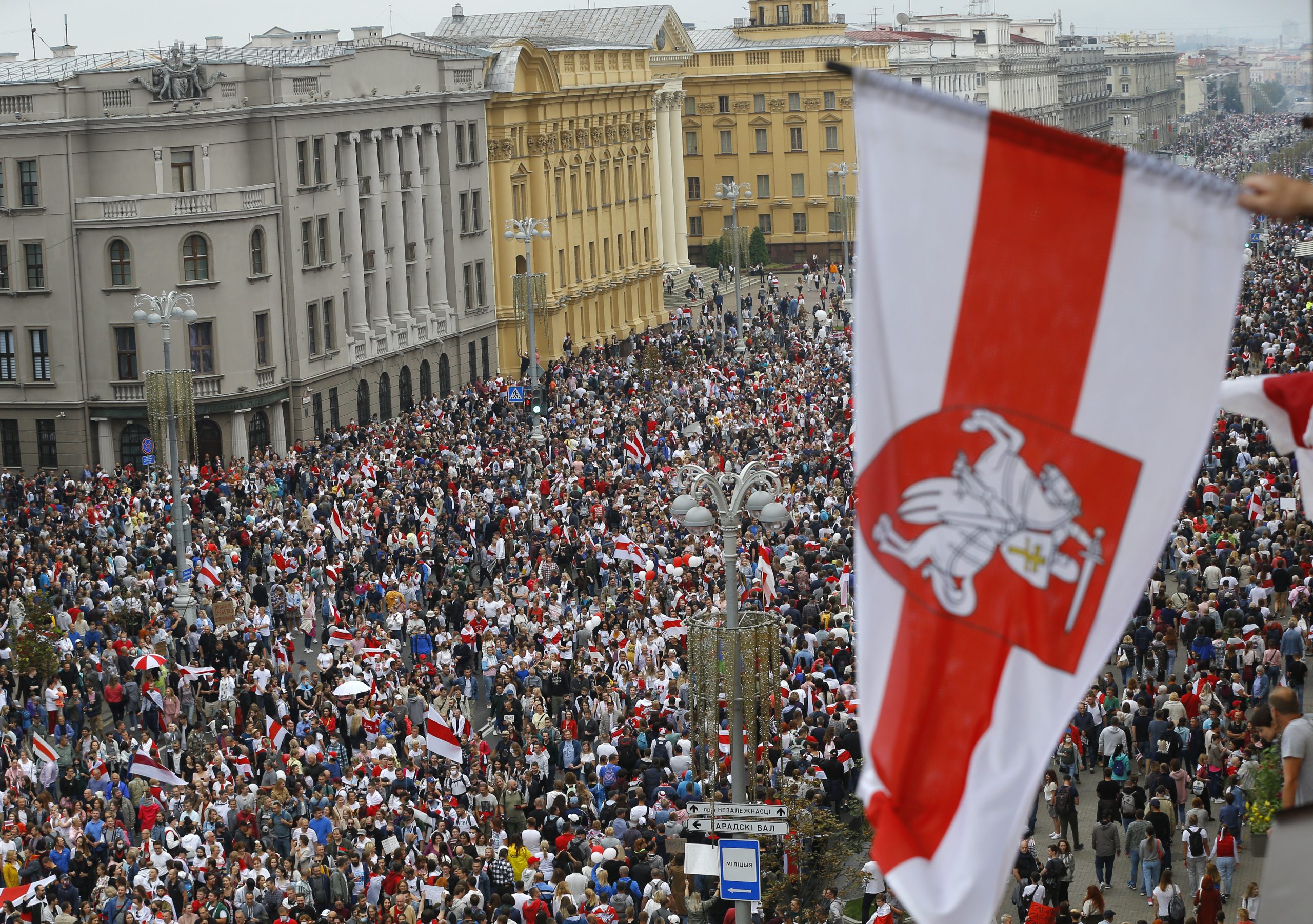One year on: Despite brutal crackdown, RFE/RL committed to serving audiences in Belarus

Tens of thousands gather for a protest in Minsk, Belarus, Sunday, Aug. 23, 2020. More than 100,00 protesters demanding the resignation of Belarus' authoritarian president are rallying in a vast square in the capital, continuing the massive outburst of dissent that has shaken the country since dubious presidential elections two weeks ago. (AP Photo/Sergei Grits)
Washington — This week marks one year since Belarus’ rigged August 9 presidential election that sparked an unprecedented uprising among Belarusians dissatisfied with their country’s status quo. Despite a brutal crackdown on dissent, heavy-handed repression by Belarusian police and security services, and efforts to criminalize journalism and the free flow of information, RFE/RL’s Belarus Service, Radio Svaboda and the Belarus correspondents reporting for RFE/RL’s Current Time team – among the last remaining independent media outlets in the country – remain committed to providing a fact-based alternative to state-run media and pro-government messaging.
As RFE/RL President Jamie Fly testified in June at a hearing of the U.S. Senate Committee on Foreign Relations, Svaboda has in the past year been able to “provide a window of truth” into events in the country, even closed-door trials, through live footage and reporting. He explained to the committee that RFE/RL’s “work was seen as so integral to truthful live coverage of the country’s protests that our cameras captured ordinary citizens chanting ‘Radio Svaboda!, Radio Svaboda!’ on August 15 outside of the State TV building, after they spotted our video crew, showing the emotional attachment Svaboda has with ordinary Belarusians.”
RFE/RL’s journalists have documented the past year’s momentous events in Belarusian, Russian, and English, when Sviatlana Tsikhanouskaya’s electoral challenge to Lukashenka’s 26-year rule was met with truncheons, smoke grenades, and long jail terms for thousands of pro-democracy activists. The journalists describe a country that has been profoundly changed by the election and protests, and a Belarusian people that is now engaged in a “national awakening,” according to a Belarusian commentator interviewed by RFE/RL.
RFE/RL journalists also collaborated on video projects focused on putting a human face on these momentous events, making use of hundreds of pieces of first-person, user-generated content to produce feature-length documentaries like Current Time’s We Didn’t Know Each Other Until This Summer, a chronicle of the first week of protests against Belarus’ 2020 election results. RFE/RL’s Svaboda and Current Time also produced shorter video reports focused on documenting for Belarusian audiences what actually happened on August 9 (August 9. How We Remembered It), as well as what happened to the protesters who raised their voices against what took place.
Working this past year in what Reporters Without Borders calls “the most dangerous country in Europe for media personnel,” RFE/RL journalists in Belarus have spent a cumulative 545 days behind bars since social media consultant Ihar Losik was arrested in June 2020. In October 2020, the Lukashenka regime blocked the service’s website. One month ago on July 16, Belarusian security officers broke through the doors of RFE/RL’s bureau in Minsk to raid the office and detained three RFE/RL journalists, part of a sweeping crackdown on independent media outlets throughout the country. More recently, a documentary filmmaker working with RFE/RL’s Current Time network, Ksenia Golubovich, was detained for questioning by Belarus’ KGB one week before the August 9 premiere on Current Time of her film “Motherland—She’s Mine,” which tells the multigenerational story of Belarusian women who were at the forefront of the protests against the Lukashenka regime.
Despite the challenges, the RFE/RL Svaboda and Current Time teams have provided exemplary journalism of several major stories involving Belarus in the past several weeks — including exclusive reporting on stories underreported or misreported in Belarus such as Belarusian opposition leader Sviatlana Tsikhanouskaya’s visit to the U.S., the defection of Olympic sprinter Krystsina Tsimanouskaya, and the suspicious death of activist Vital Shyshou in Kyiv, Ukraine.
Marking the anniversary, RFE/RL’s Jamie Fly said “We know that audiences inside Belarus continue to demand the independent journalism being provided by Svaboda and Current Time. No matter what the Belarusian authorities do to try to prevent us from reaching the Belarusian people, RFE/RL will still be there by their side as they seek facts to make decisions about their country’s future.”
About RFE/RL
Radio Free Europe / Radio Liberty is a private, independent international news organization whose programs — radio, Internet, television, and mobile — reach influential audiences in 23 countries, including Russia, Ukraine, Iran, Afghanistan, Pakistan, the republics of Central Asia and the Caucasus. It is funded by the U.S. Congress through USAGM.
Find out more
Contact Martins Zvaners
Deputy Director of Media and Public Affairs, Washington, DC
- zvanersm@rferl.org
- (202) 457-6948
